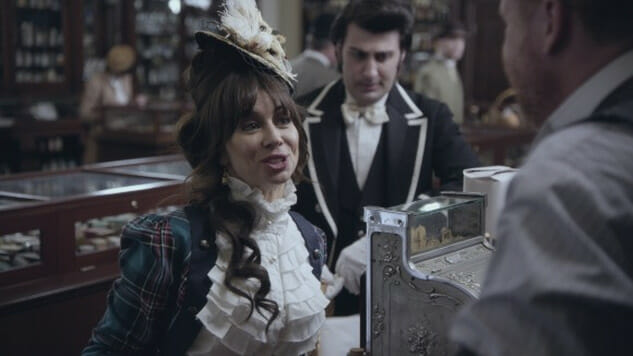Another Period Capitalizes On The Ditzy Girl Act
Just Like Light Moves Through A Vacuum

Who among us hasn’t been a slightly different person around a new love interest? It’s that strange phenomenon that almost takes its cue from human nature’s animalistic side. We preen ourselves more, taking greater care when it comes to what we wear, how we look and even how we act. In many ways, we’re always performing some version of ourselves, but that performance goes to new levels when you throw the possibility of romance in the mix. Our true selves will emerge over time—if things last—but, typically, we’re our best selves for at least that first three months of a budding relationship. All in all, such behavior seems harmless. There’s a stark difference between being a slightly enhanced version of yourself and pretending you’re something else altogether. Like playing dumb, a move so often ascribed to women it’s become a cliché at this point.
There’s a moment in Another Period’s first season when Beatrice (Riki Lindhome) briefly reveals her true intellectual capacity. As she and her brother Frederick (Jason Ritter) hang out on the family’s sweeping lawn, she makes the mistake—for a woman—of showing how smart she really is. Beatrice quickly recovers her misstep, exclaiming, “Look, the day moon!” in order to distract Frederick with a bright shiny object in the sky. At the time, it seemed like a brief gag, a quippy one-liner to point out how society treated women and how little was expected of them. But it turns out there might have been more to that moment.
In “Harvard,” Beatrice has a Good Will Hunting moment when she stumbles upon Albert Einstein’s “formula for the gravitation of the planet,” and solves the theory of relativity. Einstein is visiting Bellacourt Manor and leaves his incomplete equation on a chalkboard, which Beatrice discovers and solves. When asked how she figured it out, she says, “When I looked at the drawing, I saw that height, depth and width were represented, but then I thought, What about time? Since space has three dimensions and time is one-dimensional, I thought space-time must be a four-dimensional object, and as far as I could think both space and time could be divided without limit in size or duration.” Of course, before this moment of erudition, she admits, “I chalked it,” using language that contradicts her momentary brilliance.
-

-

-

-

-

-

-

-

-

-

-

-

-

-

-

-

-

-

-

-

-

-

-

-

-

-

-

-

-

-

-

-

-

-

-

-

-

-

-

-








































